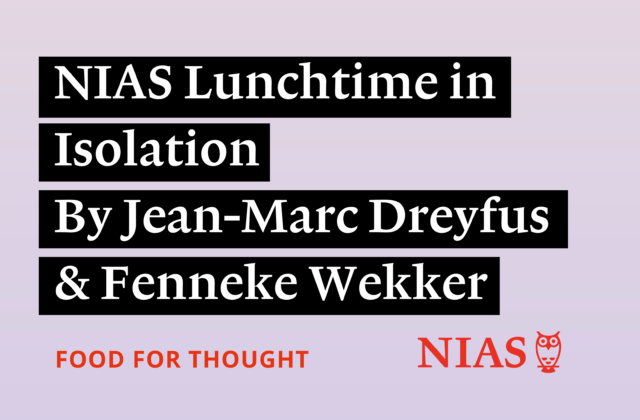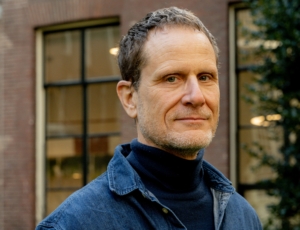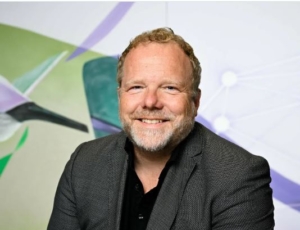FW: Jean-Marc, may I invite you to have an imaginary lunch with me? I know a real NIAS lunch is not possible right now, with you being in lockdown in Paris and I in my apartment in Amsterdam. But I do hope we can pretend, if only for a little while, we are back in the NIAS lunchroom, eating together with the other fellows. Let’s imagine we – coincidently and unexpectedly– took a seat next to each other and became engaged in an interesting, perhaps somewhat personal talk over a meal. Would you join me?
JMD: Dear Fenneke, thank you for your kind invitation. I am glad to be seated next to you: as a French guy, I am intrigued by Dutch food and the chef is adamant to serve us traditional dishes. So I pretend I taste this green-looking stew: it is a stamppot, isn’t it? It looks good, like a solid, nourishing peasant dish. But of course, this dish (strange to my palate) probably does not taste the same when eaten in Paris or in Amsterdam.
FW: To be honest, I don’t think I will eat it… It’s not a dish to have with this warm weather. After a hard day of work, of being outside in the cold, stamppot is a perfect dish. I’ll have some of the salad instead. So, tell me Jean-Marc, how is pandemic life for you in Paris?
JMD: The pandemic is really bad, has hit France very badly. Many of my friends got sick. I know many people who have lost someone close to them. The pandemic is also hitting our national ego hard: how come that France does so poorly in fighting the virus? Especially compared to Germany? The discrepancies in death figures have become an obsession for me, and I spend my time trying to find an explanation. Why are some of the oldest developed countries – Western Europe and the United States – the worst affected by the C-evil? How is it in the Netherlands? How is the Dutch self-image?
FW: I hardly know what to say. I am so sorry for you and the people around you.
The everyday experience here in the Netherlands is very different. Our bubble, the convenient bubble the Dutch live in… I think that is actually what shocks me most, I have only heard about three persons I vaguely know who have become mildly sick. The virus is out there, but it is as if we all have to be reminded of it. Of course, social quarantine has changed my everyday whereabouts, but it is not like anyone of the people close to me actually fear for their lives. I didn’t realise you were going through such a hard time. I am very sorry to hear this.
I think the differences in our experiences also explain some of the differences in the self-images of the Dutch and the French at this moment. I think the Dutch believe – and our government does not hesitate to emphasise it every week – how well we are fighting the virus, how intelligent our measures are, how social and affective we are towards our elderly and vulnerable peers and … well, how Dutch we are. The self-flattering image of the Dutch is something that has bothered me over the last couple of months, but is not new. It is the national identity constantly being promoted: we are a small, but intelligent and social country. We know how to take care of ourselves and others, and we can serve as a guiding light for all other countries in the West.
How is your imaginary stamppot?
JMD: I like it. It’s quite heavy, though. How’s your salad?
FW: I try to taste it as if it’s real. And it’s getting better with every bite.
JMD: According to the figures, the most serious ones, the most repeated and collated ones (and of course these are fragile), France and the Netherlands went through the same kind of crisis: rates of infection and death are not so dissimilar in the Netherlands and in France.
FW: In the Netherlands, we see those figures as a confirmation that we are simply doing great. While France is in ordinary lockdown, we are in an ‘intelligent lockdown’. We, the Dutch, have found incredible ways to remain comfortably locked up in our own bubble of self-idealisation. Even now, with anti-racism protests all over the world, Dutch politicians still downplay racism as mostly an ‘American problem’, ignoring the fact that racism is also at the basis of our Dutch institutions. It sometimes seems to me that the world is on fire, while we are busy tapping our own shoulders.
But I do believe – this might be a prejudice on my side – the French have a similar self-flattering image of being the best people in the world, at least in Europe. Do you think that after COVID-19 struck France, this self-image has changed? Or do you think the French pride has already vanished during the last decades – or has perhaps never existed?
JMD: France’s self-image and self-love are very fragile, France has been suffering from a narcissistic wound for years and years (I wrote about that, of course, in the domain of Holocaust memory and representation). And I realised during this crisis that, being part of the national body, I disliked the fact that my country did not do so well in fighting the virus. Why were these four times less dead in Germany? And of course, being an academic, I tried to rationalise and find rational explanations. Explanations scientists do not (fully) provide. Not yet.
FW: I am sorry I am laughing out loud. But I can totally imagine you, as a proper Frenchman, being outraged by the idea of the Germans being better in ‘doing corona-prevention’. Isn’t it funny, that the Dutch, represented by me in this case, like always feel like they are the laughing third? While actually, the numbers as you mentioned do not differ so much between France and the Netherlands. It’s all in between the ears of our transnational European head.
JMD: That’s funny indeed.
FW: I have sincerely missed this, to just sit, eat and share thoughts with NIAS-fellows on what’s going on in the world.
JMD: Thank you for this. I needed this too.
FW: Take care, and don’t forget to taste the dessert. We’ll need it to overcome these sour times.




